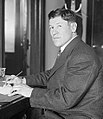The American Football Portal

American football evolved in the United States, originating from the sports of soccer and rugby. The first American football game was played on November 6, 1869, between two college teams, Rutgers and Princeton, using rules based on the rules of soccer at the time. A set of rule changes drawn up from 1880 onward by Walter Camp, the "Father of American Football", established the snap, the line of scrimmage, eleven-player teams, and the concept of downs. Later rule changes legalized the forward pass, created the neutral zone, and specified the size and shape of the football. The sport is closely related to Canadian football, which evolved in parallel with and at the same time as the American game, although its rules were developed independently from those of Camp. Most of the features that distinguish American football from rugby and soccer are also present in Canadian football. The two sports are considered the primary variants of gridiron football.
American football is the most popular sport in the United States in terms of broadcast viewership audience. The most popular forms of the game are professional and college football, with the other major levels being high-school and youth football. As of 2022[update], nearly 1.04 million high-school athletes play the sport in the U.S., with another 81,000 college athletes in the NCAA and the NAIA. The National Football League (NFL) has the highest average attendance of any professional sports league in the world. Its championship game, the Super Bowl, ranks among the most-watched club sporting events globally. In 2022, the league had an annual revenue of around $18.6 billion, making it the most valuable sports league in the world. Other professional and amateur leagues exist worldwide, but the sport does not have the international popularity of other American sports like baseball or basketball; the sport maintains a growing following in the rest of North America, Europe, Brazil, and Japan. (Full article...)The history of American football can be traced to early versions of rugby football and association football. Both games have their origin in multiple varieties of football played in the United Kingdom in the mid-19th century, in which a football is kicked at a goal or kicked over a line, which in turn were based on the varieties of English public school football games descending from medieval ball games.
American football resulted from several major divergences from association football and rugby football. Most notably the rule changes were instituted by Walter Camp, a Yale University athlete and coach who is considered to be the "Father of American Football". Among these important changes were the introduction of the hike spot, of down-and-distance rules, and of the legalization of forward pass and blocking. In the late 19th and early 20th centuries, gameplay developments by college coaches such as Eddie Cochems, Amos Alonzo Stagg, Parke H. Davis, Knute Rockne, and Glenn "Pop" Warner helped take advantage of the newly introduced forward pass. The popularity of college football grew as it became the dominant version of the sport in the United States for the first half of the 20th century. Bowl games, a college football tradition, attracted a national audience for college teams. Boosted by fierce rivalries and colorful traditions, college football still holds widespread appeal in the United States (Full article...)
General images
Selected image

Selected biography -
Anthony Royell Akins (born May 10, 1977) is a former Canadian football wide receiver and slotback who played for the Hamilton Tiger-Cats of the Canadian Football League (CFL) from 1999 to 2003. He played in 61 regular season games, catching 121 receptions for 2,138 yards and 14 touchdowns. He also returned punts and kickoffs. Akins is a Grey Cup champion.
Akins played high school football at Starkville High School before playing at East Mississippi Community College. He later transferred to Eastern Louisiana University and played for the Warhawks. After going unselected in the 1999 NFL draft, Akins was signed by the Buffalo Bills of the National Football League but was cut before the beginning of the regular season. He was signed by the Hamilton Tiger-Cats shortly after and spent his first two seasons moving between the practice squad and the active roster, playing in 9 games each season and contributing heavily on special teams. Akins transitioned to a more offensive role in 2001, but his career was interrupted in later seasons by repeated injuries. (Full article...)
Calendar
| Jan 8 | College Football National Championship: #1 Michigan vs #2 Washington | |
| Jan 13-15 | NFL: Wild Cards | |
| Jan 20-21 | NFL: Divisional games | |
| Jan 28 | NFL: Conference games | |
| Feb 4 | NFL: Pro Bowl Games | |
| Feb 11 | NFL: Super Bowl LVIII | |
| 2023 season: NFL • NCAA FBS (Bowl games) | ||
|---|---|---|
Selected quote
| “ | You can call it a miracle or a legend or whatever you want to. I just know that on that day, Brett Favre was larger than life. | ” |
| — Gene Stallings former University of Alabama coach on Favre after he led the University of Southern Mississippi to a victory over Stalling's Alabama team. Less than six weeks earlier Favre underwent surgery to remove 30 inches of his small intestine. |
Did you know...
- ...that running back Garrison Hearst is the only player in league history to have twice won the Comeback Player of the Year Award?
- ...that the Sutherland version of the single-wing offensive formation, named for coach Jock Sutherland, pictured, had fallen into nearly-complete disuse on the collegiate and professional levels by 1970?
- ...that only one player since 1998, University of Miami Hurricanes linebacker Dan Morgan in 2000, has claimed the Bronko Nagurski Trophy and the Chuck Bednarik Award in the same year?
Subcategories
Things you can do

|
|
Lists
- List of NFL champions
- NCAA Division 1A Champions
- List of Pro Football Hall of Fame inductees
- List of NFL first overall draft_picks
- List of National Football League head coaches
- List of NFL rushing champions
- List of college football coaches with 200 career wins
- List of current NFL team rosters
- National Football League 1940s All-Decade Team
- National Football League 1960s All-Decade Team
- National Football League 1970s All-Decade Team
- National Football League 1980s All-Decade Team
- National Football League 1990s All-Decade Team
- List of NFL franchise post-season droughts
Sports portals
Associated Wikimedia
The following Wikimedia Foundation sister projects provide more on this subject:
-
Commons
Free media repository -
Wikibooks
Free textbooks and manuals -
Wikidata
Free knowledge base -
Wikinews
Free-content news -
Wikiquote
Collection of quotations -
Wikisource
Free-content library -
Wikiversity
Free learning tools -
Wiktionary
Dictionary and thesaurus






















































